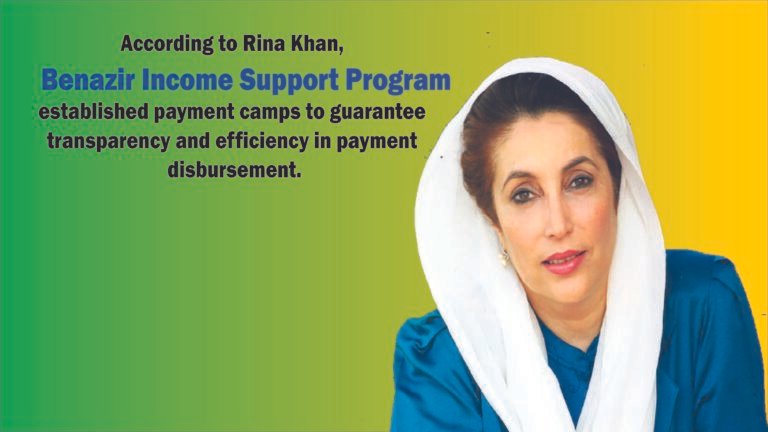According to Rina Khan, the Benazir Income Support Program established payment camps to guarantee transparency and efficiency in payment disbursement.
In a bid to enhance the efficiency and transparency of cash disbursements, the Benazir Income Support Programme (BISP) has established dedicated payment campsites across Pakistan. This move, aimed at streamlining the distribution process and minimizing discrepancies, was announced by Rubina Khalid, a key spokesperson for the initiative.
Background of BISP
The Benazir Income Support Programme, launched in 2008, is Pakistan’s premier social safety net initiative, targeting the most vulnerable segments of the population. Named after the late Benazir Bhutto, the programme is designed to provide financial assistance to underprivileged families, thus helping to alleviate poverty and empower women. Over the years, BISP has evolved into a multifaceted support system, incorporating various educational and health-related initiatives.
The Need for Payment Campsites
Despite its noble objectives, BISP has faced numerous challenges, particularly in the areas of payment disbursement and ensuring that aid reaches the intended beneficiaries. Issues such as corruption, mismanagement, and logistical hurdles have occasionally marred the programme’s reputation. To address these challenges, Rubina Khalid emphasized the establishment of payment campsites as a critical reform.
“The primary objective of these campsites is to ensure that the process of cash disbursement is both transparent and efficient,” said Khalid. “We want to ensure that every rupee allocated for the poor reaches them without any deductions or delays.”
Operational Mechanism
The payment campsites are strategically located in areas with high concentrations of BISP beneficiaries. These sites are equipped with necessary infrastructure, including biometric verification systems, to authenticate recipients. This verification process is crucial in eliminating ghost beneficiaries and ensuring that only genuine, eligible individuals receive aid.
“We have integrated biometric verification to cross-check identities and prevent fraud,” explained Khalid. “This system helps in creating a robust mechanism where only those who truly deserve assistance are catered to.”
Training and Deployment
To ensure the smooth operation of these campsites, BISP has undertaken extensive training programmes for staff. These training sessions focus on handling biometric equipment, managing beneficiary data, and addressing any on-ground issues that might arise during disbursement.
“Our staff are our frontline soldiers in this battle against poverty,” Khalid remarked. “We have invested significantly in their training to ensure they can handle any situation with efficiency and empathy.”
Beneficiary Experience
The response from beneficiaries has been overwhelmingly positive. Many recipients have praised the new system for its efficiency and the dignified manner in which they are treated. The campsites offer a more structured and orderly environment compared to previous methods of disbursement, which were often chaotic and disorganized.
“I used to wait for hours and sometimes return home empty-handed,” said Ayesha, a beneficiary from Lahore. “Now, with the new campsites, I am assured of receiving my payment without any hassle.”
Challenges and Future Prospects
While the establishment of payment campsites marks a significant improvement, Rubina Khalid acknowledged that challenges remain. Ensuring that campsites are accessible to all beneficiaries, especially those in remote areas, is a major concern. There is also the ongoing task of maintaining the integrity and security of the biometric systems against potential technical failures or cyber threats.
“We are continuously monitoring and refining the system to address any emerging issues,” Khalid assured. “Our goal is to create a model of transparency and efficiency that can be emulated by other social support programmes.”
Looking ahead, BISP plans to expand the campsite model further, incorporating feedback from beneficiaries and staff to enhance its effectiveness. The programme is also exploring the integration of mobile payment systems to reach even more recipients and reduce the dependency on physical campsites.
The introduction of payment campsites by the Benazir Income Support Programme represents a significant stride towards improving the delivery of financial assistance to Pakistan’s poorest families. Under the leadership of figures like Rubina Khalid, BISP is not only addressing immediate logistical challenges but also setting a new standard for transparency and efficiency in public welfare programmes.
“The establishment of these campsites is a testament to our commitment to the people of Pakistan,” concluded Khalid. “We will continue to innovate and adapt, ensuring that the most vulnerable in our society receive the support they need with dignity and respect.”
Through these efforts, BISP aims to foster a more equitable society, where financial aid is not just a promise but a guaranteed support system that reaches those who need it the most, thereby contributing to the overarching goal of poverty alleviation and social upliftment in Pakistan.
